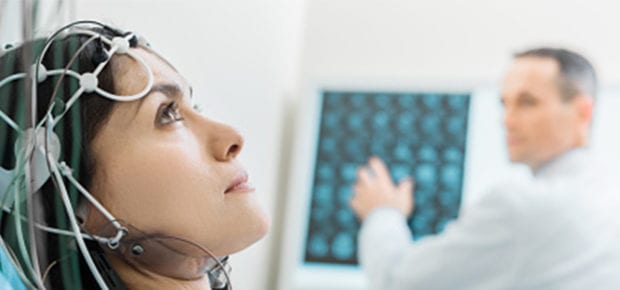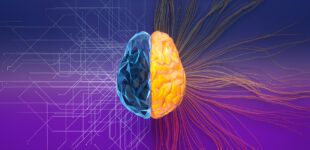August 1, 2018
Our quality of sleep is an integral part of our everyday lives, the subject of sleep is increasingly becoming a topic we talk about. But only recently has the topic become something that’s widely studied.
Before 1952, sleep studies focused on dreams and dream interpretations. Medical professionals did not become interested in understanding sleep physiology, sleep deprivation or treating sleep disorders until the 21st century.
Today, much has changed on the subject of sleep. It is common for doctors to ask you how much sleep you are getting and when you fall asleep at night. These questions help practitioners understand how your sleep habits are impacting your health.
Sleeping with AI and Machine Learning
Researchers at MIT are working on a way to capture sleep data wirelessly to measure and analyze sleep patterns. Using an artificial intelligence (AI) -enabled device that emits radio waves, and an algorithm that analyzes those signals, researchers gain the ability to monitor a person’s sleep quality in their natural environment for a long period of time, rather than forcing them to visit a lab. You can read more about it on IEEE Spectrum here.
Plus, the applications of this data go well beyond the study of sleep disorders. It’s important to gain insights into other factors that can affect sleep quality.
“Doing this wirelessly in your own bedroom, you could really see the impact of drugs, and progression of diseases by long-term monitoring,” says Dina Katabi, a professor of electrical engineering and computer science at MIT, who led the work, according to the article.
Another emerging area in the study of sleep is the application of machine learning (ML). Mattresses can incorporate machine learning to help you have a better sleep environment. The bed will adjust to your sleep patterns by using air to reposition the mattress in real time. A similar ‘smart bed’ can gather data on your movement and position while sleeping. The technology also considers environmental factors that could be at play. The data can help you understand why you’re experiencing insomnia or sleep apnea at night.
“Tests on the prototype in controlled lab conditions highlighted that the mattress can reliably detect a subject’s position and motion, heart rate and breathing activity,” reports the study. “It correctly classifies four behavioral conditions — no bed occupancy, wakefulness, non-REM sleep, and REM sleep– which are the basis for creating an objective sleep quality index.”
Other Technologies for Sleep
Machine learning and AI are not the only way we’re now studying sleep behaviors. Wearables are increasingly becoming a popular method to study sleep.
An IEEE xplore study is testing wearable sensor technologies on people with sleep apnea. The technology monitors respiratory rate by placing a sensor on the person’s abdomen or even using a temperature sensor on their nose.
Wearable and other technologies are also being used to study people who do not have chronic sleep conditions. You can read more about other innovative sleep technologies being explored here.
Do not lose hope if you have trouble sleeping or staying asleep. Sleep research is evolving with today’s newest technologies. This advancement may well lead to more products that can help you get a good night’s sleep.





 Meaningful Momentum or Running in Place?
Meaningful Momentum or Running in Place? AI Through Our Ages
AI Through Our Ages Liquid Infrastructure: Our Planet's Most Precious Resource
Liquid Infrastructure: Our Planet's Most Precious Resource The Impact of Technology in 2025
The Impact of Technology in 2025 Quantum and AI: Safeguards or Threats to Cybersecurity?
Quantum and AI: Safeguards or Threats to Cybersecurity? Why AI Can't Live Without Us
Why AI Can't Live Without Us Bits, Bytes, Buildings and Bridges: Digital-Driven Infrastructure
Bits, Bytes, Buildings and Bridges: Digital-Driven Infrastructure Impact of Technology in 2024
Impact of Technology in 2024 Emerging AI Cybersecurity Challenges and Solutions
Emerging AI Cybersecurity Challenges and Solutions The Skies are Unlimited
The Skies are Unlimited Smart Cities 2030: How Tech is Reshaping Urbanscapes
Smart Cities 2030: How Tech is Reshaping Urbanscapes Impact of Technology 2023
Impact of Technology 2023 Cybersecurity for Life-Changing Innovations
Cybersecurity for Life-Changing Innovations Smarter Wearables Healthier Life
Smarter Wearables Healthier Life Infrastructure In Motion
Infrastructure In Motion The Impact of Tech in 2022 and Beyond
The Impact of Tech in 2022 and Beyond Cybersecurity, Technology and Protecting Our World
Cybersecurity, Technology and Protecting Our World How Technology Helps us Understand Our Health and Wellness
How Technology Helps us Understand Our Health and Wellness The Resilience of Humanity
The Resilience of Humanity Harnessing and Sustaining our Natural Resources
Harnessing and Sustaining our Natural Resources Creating Healthy Spaces Through Technology
Creating Healthy Spaces Through Technology Exceptional Infrastructure Challenges, Technology and Humanity
Exceptional Infrastructure Challenges, Technology and Humanity The Global Impact of IEEE's 802 Standards
The Global Impact of IEEE's 802 Standards Scenes of our Cyber Lives: The Security Threats and Technology Solutions Protecting Us
Scenes of our Cyber Lives: The Security Threats and Technology Solutions Protecting Us How Millennial Parents are Embracing Health and Wellness Technologies for Their Generation Alpha Kids
How Millennial Parents are Embracing Health and Wellness Technologies for Their Generation Alpha Kids Space Exploration, Technology and Our Lives
Space Exploration, Technology and Our Lives Global Innovation and the Environment
Global Innovation and the Environment How Technology, Privacy and Security are Changing Each Other (And Us)
How Technology, Privacy and Security are Changing Each Other (And Us) Find us in booth 31506, LVCC South Hall 3 and experience the Technology Moon Walk
Find us in booth 31506, LVCC South Hall 3 and experience the Technology Moon Walk Virtual and Mixed Reality
Virtual and Mixed Reality How Robots are Improving our Health
How Robots are Improving our Health IEEE Experts and the Robots They are Teaching
IEEE Experts and the Robots They are Teaching See how millennial parents around the world see AI impacting the lives of their tech-infused offspring
See how millennial parents around the world see AI impacting the lives of their tech-infused offspring Take the journey from farm to table and learn how IoT will help us reach the rising demand for food production
Take the journey from farm to table and learn how IoT will help us reach the rising demand for food production Watch technical experts discuss the latest cyber threats
Watch technical experts discuss the latest cyber threats Explore how researchers, teachers, explorers, healthcare and medical professionals use immersive technologies
Explore how researchers, teachers, explorers, healthcare and medical professionals use immersive technologies Follow the timeline to see how Generation AI will be impacted by technology
Follow the timeline to see how Generation AI will be impacted by technology Learn how your IoT data can be used by experiencing a day in a connected life
Learn how your IoT data can be used by experiencing a day in a connected life Listen to technical experts discuss the biggest security threats today
Listen to technical experts discuss the biggest security threats today See how tech has influenced and evolved with the Games
See how tech has influenced and evolved with the Games Enter our virtual home to explore the IoT (Internet of Things) technologies
Enter our virtual home to explore the IoT (Internet of Things) technologies Explore an interactive map showcasing exciting innovations in robotics
Explore an interactive map showcasing exciting innovations in robotics Interactively explore A.I. in recent Hollywood movies
Interactively explore A.I. in recent Hollywood movies Get immersed in technologies that will improve patients' lives
Get immersed in technologies that will improve patients' lives